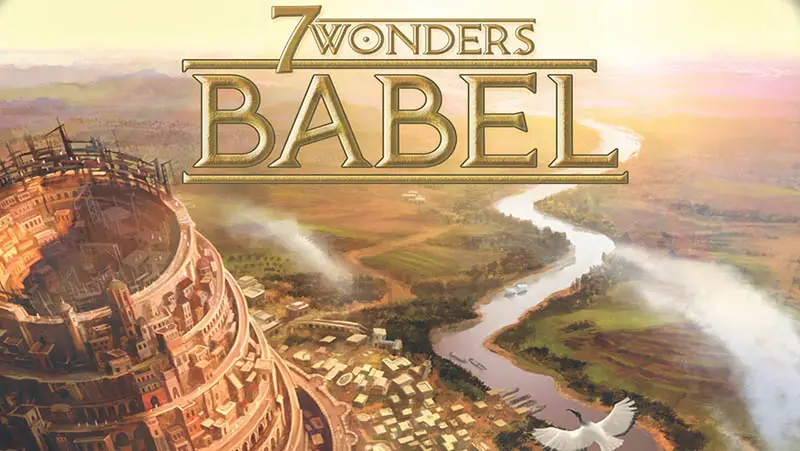
Babel is made up of two expansions, which may be played together or separately.
The first expansion, Tower of Babel, will allow you to erect the mythical tower. Each tile built will infl uence all of the players with regards to commerce, war, science, and civil affairs…
The second expansion, Great Projects of Babel, will allow you to enhance the area around Babel. Build its city wall, its port, or even its archives, and raise obelisks, triumphal arches, or other prestigious monuments to surround the Tower.
For your first few games, we suggest you play only with the Tower of Babel expansion, then only with the Great Projects of Babel expansion. Make sure that each player has played each expansion separately before combining them. You will then be able to combine these expansions with Leaders, Cities and/or the Wonder Pack.
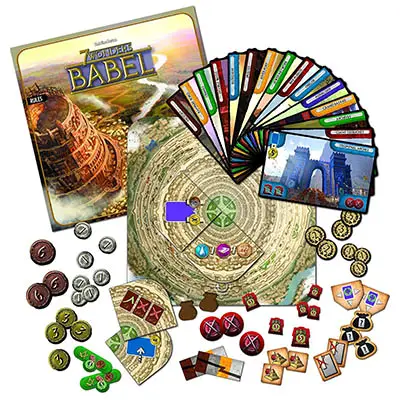
Components
- 1 Babel board
- 24 Babel tiles
- 15 Great Project cards
- 10 Participation tokens
- 166 tokens (multiple types)
- 1 scorebook
- 1 rulebook
- 1 helpsheet

Game Elements
Babel Board
The game board represents the Tower of Babel. Depending on the number of players, choose the appropriate side (one side for games with 2, 3, or 4 players and one side for games with 5, 6, 7, or 8 players).
Babel Tiles
The Babel tiles represent parts of the Tower which may be built during the game. There are 24 tiles in all, and they are all different from one another.
Defeat Tokens And Military Victories
Extra tokens are included to show the effects of some Babel tiles.
Setup
Place the Babel board in the middle of the table and shuffle the Babel tiles.
After having received their Wonder board and their starting 3 coins, each player is dealt 3 random Babel tiles. The tiles that have not been dealt out are returned to the box.
Each player secretly chooses one tile from the 3 they have received and places it in front of themselves, face down. The remaining 2 tiles are then passed to the player on their right.
Each player secretly chooses one tile from the 2 they have received from the player on their left. The remaining tile is then passed to the player on their right.
Each player takes the last tile from the player to their left and adds it to the 2 tiles previously kept.
At the end of this phase, each player has thus created a hand of 3 Babel tiles for themselves. Age I can now begin.
Age Overview
The game plays out according to the rules in the basic game. Howe- ver, the players may now discard their chosen card to take part in the construction of the Tower of Babel.
This means that there are now 4 possible actions with the card chosen:
- Build a structure.
- Build a stage of their Wonder.
- Discard the card to gain 3 coins.
- Discard the card to build a Babel tile.
When a player chooses to build a Babel tile, that player places it near the Babel board face down and discards their card. Once all the players have resolved their actions, the Babel tiles are revealed and placed on the Babel board.
Important: the placement of the Babel tiles on the board is the last thing resolved in a turn, after all players have performed their actions (construction, gain and expenditure of coins, effects of wonders).
Placement of the Babel tiles
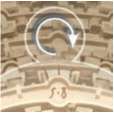
The first Babel tile to be built must be placed on the appropriate space of the board. Each subsequent tile will be placed clockwise. When all spaces are filled, the next tiles will cover those previously played, still going clockwise, to form a spiral.
Clarification: depending on the side of the Babel board used, at most 3 or 4 Babel tiles will be visible at the same time.
If multiple players build a Babel tile during a given turn, they must look at the numbers shown on the tiles and place them in increasing order.
/Example: There are already three Babel tiles built. Dale and Brian both take part in constructing Babel this turn. They play their Babel tiles face down next to the board. At the end of the turn, the 2 tiles are revealed, first we place tile 4, then tile 12. Tile 4 is placed on the last free space, and tile 12 covers the first tile played.
Effect of the Babel tiles
Each Babel tile offers an effect which changes the rules of the game for all players as long as it is active, which means from the turn following the tile entering play until it is covered by another Babel tile.
End of the Game
At the end of the game, players earn victory points according to their participation in the construction of the Tower of Babel:
- 1 Babel tile built: 2 victory points
- 2 Babel tiles built: 5 victory points
- 3 Babel tiles built: 10 victory points
Note: The victory points earned through Babel tiles are scored directly on the score sheet.
Effects of the Babel tiles


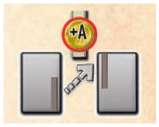

(Tiles 1-6-13-16)
These 4 tiles force all players to pay a tax to the bank corresponding in amount to the current Age whenever they build a corresponding building, a Wonder stage, or use a chain. For example, 1 coin during Age I, 2 coins during Age II, and 3 coins during Age III.


(Tiles 2-15)
These two tiles allow players to ignore the resource cost when constructing military buildings or for a Wonder stage.
Note: If the cost of the Wonder stage contains one or more coins, they must stil be paid.

(Tile 7)
Each player may use the buildings of both of their neighboring cities to construct their buildings for free via a chain.
Example: When this tile is active, Cedrick can build the Academy for free if one of his two neighboring cities possesses the School.

(Tile 22)
The taking of military Defeat tokens is modified as follows: If you must take 1 Defeat token, take 2.
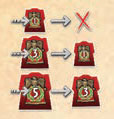
(Tile 19)
The taking of military Victory tokens is modified as follows:
- If you must take a 1VP token, take nothing.
- If you must take a 3VP token, take a 1VP token.
- If you must take a 5VP token, take a 3VP token.


(Tiles 5-14)
These two tiles grant players a bonus corresponding to the current Age after the construction of a civil building (blue card) or the use of a chain. For example, 1 coin during Age I, 2 coins during Age II, and 3 coins during Age III.
The coins are taken from the bank.

(Tile 24)
After building a Guild (purple card), a player gains a 5 coins bonus. Coins are taken from the bank.
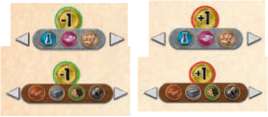
(Tiles 9-10-11-12)
These four tiles modify the price of commerce when purchasing resources from neighboring cities.
Notes:
- These rebates/increases are cumulative with those from the Marketplace, the Trading Posts, and the Clandestine Docks.
- It is possible to purchase multiple resources for free with cumulative rebates, but the minimum purchase price is zero, and can never be negative.
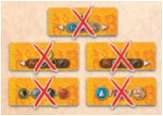
(Tile 4)
The effect of the following cards may not be used: Eastern Trading Post, Western Trading Post, Marketplace, Caravansery and Forum. Note: Once this tile is active, it is possible to construct these buildings or use their chains.
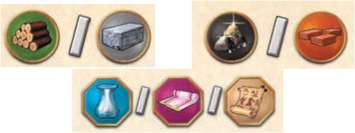
(Tiles 17-18-21)
These 3 tiles allow each player to benefit once per turn a free resource from among those shown on the tile.
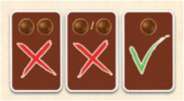
(Tile 3)
The brown double or mixed cards are unusable.
Notes:
- However, it is possible to build these buildings when this tile is active (they become usable when the tile wil covered by another tile).
- The brown double cards are cards that produce two copies of a resource (Sawmil, Quarry, Brickyard and Foundry), and brown mixed cards offer two different resources (Tree Farm, Excava- tion, Clay Pit, Timber Yard, Forest Cave, and Mine).
- The brown single cards are cards that produce a single resource (Lumber Yard, Stone Pit, Clay Pool and Ore Vein).

(Tile 20)
Raw materials cards (brown cards) which produce a unique resource (Lumber Yard, Stone Pit, Clay Pool and Ore Vein) produce an infinite number of resources.
Note: Resources produced by the player boards are not considered as cards, and are thus not affected.

(Tiles 8-23)
The construction of civil buildings (blue cards) or of Guilds (purple cards) via resources is forbidden. Their construction requires a number of coins equal to the number of resources present in their construction cost. These coins are paid to the bank.
Note: construction of civil cards via chains remains possible and free.
Examples: The Traders Guild requires 3 resources to be built and will thus cost 3 coins (which are paid to the bank). The Pantheon costs 6 coins or requires the Temple to be built via a chain.
2 Player Games
For 2 player games, only 2 Babel Tiles are active simultaneously (at the beginning of the game, place a Babel tile face down to fill the third space).
The Free City doesn't get any Babel Tiles.
Playing with Leaders and Cities
Before starting the game, perform the Leaders phase, followed by the Preparation of Babel Tiles phase.
The players may discard a Leaders card or a Cities card to construct a Babel Tile.
Note on some Leaders cards:
- Ramses: the construction of Guilds remains free, even if Tile 23 is in play.
- Vitruvius: the coins granted by Vitruvius are cumulative with that of Tile 14.
- Hatshepsut: her effect works even if the player purchases a resource for 0 coins through the use of Babel tiles 9 and 11 and with buildings offering a rebate on commerce.
- Tomyris: Tomyris is applied to all military defeat tokens earned during military confl icts.
Note on some Cities cards: The resources granted by the Babel Tiles 17, 18, and 21 are not taken into account for the Secret Warehouse and Black Market cards.

Contents
Great Project Cards
The Great Projects of Babel are prestigious buildings which players will attempt to construct.
Each card has a color, a name, a participation cost (in the upper left corner), a penalty, and a reward.
There are 15 in total, 5 for each Age.

Participation Tokens

These tokens represent the participation of players in the construction of Great Projects.
Reward Tokens
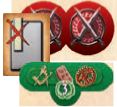
These tokens represent the various rewards that players may earn when construction is successful.
Penalty Tokens
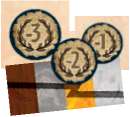
These tokens represent the various penalties that players may suffer when the construction of a Great Project fails.
Note: We have planned for a large number of tokens of al sorts, but in the rare case where there are not enough, use substitute tokens.
Setup
At the beginning of each Age, before players get their hand of cards, randomly take a Great Project card of the current Age and place it face-up in the middle of the table. Then place on the Great Project card as many Participation tokens as there are players, minus one.
Example: In a 5 player game, there will thus be 4 tokens.
Overview of an Age
From now on, when a player constructs a building of the same color as the Great Project card in play (Brown, Blue, Red, Yellow, Green, or Purple), that player has the option to participate in its construction. To do that, the player must pay the participation cost in addition to the cost of their building. In return, the player takes a Participation token which they place on their Wonder board.
Coin costs: coins are paid to the bank.
Resource costs: resources may be produced or purchased according to the usual construction and commerce rules.
Note:
- If there are no Participation tokens left on the Great Project card, it is no longer possible to participate during that Age.
- If many players participate in a given turn and there are not enough Participation tokens, extra tokens are then taken from the reserve so that each participant gets one.
- A player can get multiple Participation tokens during a given Age if they participated multiple times. However, players may not participate multiple times during a given turn.
- The free construction of a building (via chain, Olympia, Hali- carnassus, Solomon, etc). does not prevent participation in the Great Project. The player must stil pay the participation cost, however.
Example: During Age I, the "River Port" (yelow) Great Project card is in play. Derek builds the Forum (yelow card) using one Clay he produces and a second, which he purchases. He chooses to pay one extra coin to the bank and buys a Loom, the participation cost of the Great Project, to gain a Participation token.
End of the Age
Before the resolution of the current Age's military conflicts, the players must resolve the construction of the Great Project of Babel. Two situations are possible:
A. The Great Project Is A Success
If all Participation tokens have been taken by players, the Great Project is a success. All players who participated gain as many Reward tokens as they have Participation tokens in their possession. There are no consequences for players who possess no participa- tion tokens.
Example: Derek possesses 2 Participation tokens by the end of Age II. The reward of the War Mirror card is 1 Age I military Vic- tory token. He thus gets 2 Age II military Victory tokens from the reserve.
B. The Great Project Is A Failure
If one or more Participation tokens remain, the Great Project is a failure. Players who do not have a Participation token are sanctioned! They suffer the penalty shown on the Great Project card.
Players who possess one or more Participation tokens get no penal- ties, but do not gain any rewards, either.
Example: At the end of Age II, Derek possesses 2 Participation tokens, but gets nothing as there are still tokens on the Archives card. Tom, however, does not have a single token, and must thus suffer the penalty shown on the Archives card and lose a blue card of his choice.
Unable To Pay Penalty
If a player cannot pay the penalty of a Great Project card, that player must then take a Penalty token from the corresponding Age. For example, -1, -2, or -3 victory points.
Example: At the end of Age II, the Great Project is not built, Chris does not have any Participation tokens, and the penalty of the Great Project requires him to discard al of his coins. As he does not have a single coin, he must take an Age I penalty token, mea- ning a loss of 2 victory points.
At the end of each Age, players must return all Participation tokens in their possession.
End of the Game
At the end of the game, the players also add up the Babel victory or penalty points earned over the three Ages.
Note: To make things easier, we recommend you to total your Babel Victory points (positive or negative) tokens with your blue cards and your total military tokens together.
Effects Of The Great Project Cards
Penalties

The player must discard a card of their choice of the corresponding color.

The player must discard all of their coins.

The player discards 2 military Victory tokens of their choice.

The player loses, until the end of the game, the use of the resource or benefit of their Wonder. To represent that penalty, the player takes a matching token from the reserve and places in on the corresponding space of their Wonder board.
Note: Manneken Pis does not lose his starting benefit and takes a -1VP penalty token instead.
Reminder: If a player cannot pay the penalty of a Great Project card, that player must then take a Penalty token of the corresponding Age. For example, -1, -2, or -3 victory points.
Rewards

The player takes the corresponding number of coins from the bank.

The player takes a corresponding Shield token. This token is added to their military strength during each conflict.

The player takes a corresponding military Victory token from the reserve.

The player takes from the reserve a corresponding token. They can return it to the reserve to participate in a Grand Project without taking into account the color of this Grand Project.
Notes:
- It is not possible to participate in a Grand Project during the construction of a Wonder stage or during the recruitment of a Leader.
- If the effects of a Wonder or a Leader permits to construct a building, you can participate in the Grand Project.

The player takes from the reserve a corresponding token. They can return this token to the reserve to construct a Building for free.

The player takes from the reserve a corresponding token. They can return this token to the reserve, to construct a Stage of their Wonder for free.
Note: if the cost of the Wonder stage contains 1 or more coins, these must still be paid.

The player takes from the reserve a corresponding token. At the end of the game, this token will be worth 3 points for each group of 3 different scientific symbols.
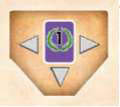
The player takes from the reserve a corresponding token. At the end of the game, this token will be worth 1 victory point for each Guild built by the player and by their neighbors.
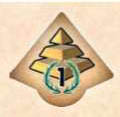
The player takes a corresponding token from the reserve. At the end of the game, this token will be worth 1 victory point for each stage of a Wonder built on your own City.
2 Player Games
At the beginning of each Age, place 2 Participation tokens on the Great Project.
In 2 player games, the Free City cannot participate in the construction of Great Projects of Babel. In all cases, it does not suffer penalties for its lack of participation.
The Full Game
For games using all the expansions, the overview of a game is as follows:
Setup
Distribution of Leaders and dividing.
Distribution of the Babel tiles and dividing.
Beginning Of An Age
Leaders recruitment Phase.
Setup of current Age's Great Project.
Distribution of the Age cards.
End of an Age
Resolution of the Great Project (Penalties / Rewards)
Resolution of military conflicts
Continue Reading


